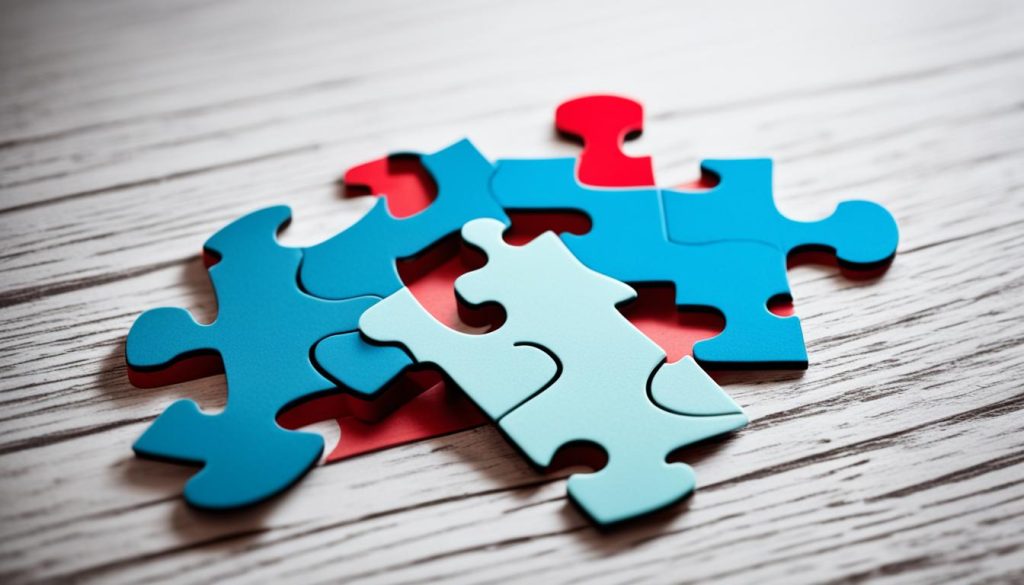As a man who spent a decade loving a woman with a chronic illness, I have experienced firsthand the importance of relationship support and maintenance. My wife’s journey with endometriosis and fibromyalgia shaped me into the man I am today.
Throughout the years, I have learned to be a source of emotional support for my partner, advocating for her needs and helping her navigate the challenges of living with chronic pain. This journey has not only deepened our bond but also compelled me to share my knowledge and expertise with other men facing similar circumstances.
I started a blog where I share our experiences, provide resources, and offer guidance on how to best support a partner with chronic illness. Not only is it a therapeutic outlet for me, but it also allows me to connect with others who may be struggling with the same challenges in their relationships.
By sharing our story, I hope to inspire and empower other men to become advocates for their ill partners and provide them with the support they need. Through my blog, I aim to foster a community where individuals can learn from one another and find solace in knowing they are not alone.
What is Mutual Respect?
Mutual respect is the foundation of a healthy and fulfilling relationship. It goes beyond simply tolerating each other’s presence and involves valuing each other’s opinions, treating each other with dignity and consideration, and acknowledging each other’s feelings. When you have mutual respect in your relationship, you create a safe space where both partners can thrive.
So, how do you define mutual respect?
Mutual respect is a two-way street where each person in a relationship acknowledges and considers the thoughts, emotions, and ideas of the other person. It is about accepting and appreciating each other’s unique qualities, strengths, and perspectives. When you truly respect your partner, you create a sense of trust and understanding that allows your relationship to grow and flourish.
Why is it important to value each other’s opinions?
Valuing each other’s opinions is an essential component of mutual respect. When you genuinely listen to your partner’s thoughts and ideas, you demonstrate that their perspective matters to you. This fosters a sense of equality and encourages open communication. By valuing each other’s opinions, you create an environment where both partners feel heard, understood, and respected.
How does treating each other with dignity and consideration contribute to mutual respect?
Treating each other with dignity and consideration is a fundamental aspect of mutual respect. It involves treating your partner with kindness, empathy, and respect, even during challenging times. By showing respect in your words and actions, you foster a sense of safety and emotional security within the relationship. This promotes a healthy, supportive, and loving dynamic.
Let’s highlight the importance of mutual respect with a table:
| Benefits of Mutual Respect |
|---|
| 1. Building a strong foundation of trust and understanding. |
| 2. Encouraging open and honest communication. |
| 3. Promoting equality and fairness within the relationship. |
| 4. Fostering a safe and supportive environment. |
| 5. Enhancing emotional connection and intimacy. |
| 6. Supporting personal and professional growth. |
By prioritizing mutual respect in your relationship, you lay the groundwork for a fulfilling and lasting connection. The next section will explore the importance of mutual respect in more detail.
The Importance of Mutual Respect in a Relationship
Mutual respect serves as a fundamental pillar for building and nurturing a strong and fulfilling relationship. It lays the groundwork for trust, understanding, and intimacy, forming a solid bond between partners.
When both individuals in a relationship practice mutual respect, they create an environment where open and honest communication thrives. Each partner feels valued and heard, leading to a deeper understanding of one another’s needs and desires.
Respecting each other’s boundaries and opinions fosters an atmosphere of trust. It allows partners to feel secure in expressing their thoughts and emotions without fear of judgment or rejection. This level of trust strengthens the emotional connection and promotes a sense of safety within the relationship.
Building a strong bond requires both partners to actively foster mutual respect in their daily interactions. Here are some ways in which mutual respect can be nurtured:
- Practice active listening: Be fully present when your partner speaks, giving them your undivided attention. Show genuine interest in their thoughts and feelings, and avoid interrupting or dismissing their perspectives.
- Validate each other’s feelings: Acknowledge and validate your partner’s emotions, even if you don’t necessarily agree with their viewpoint. Letting them know that their feelings are heard and understood promotes a sense of mutual respect.
- Communicate with kindness: Use kind and respectful language when addressing each other, even in times of disagreement. Avoid personal attacks or belittling remarks that can damage trust and respect.
- Support personal and professional growth: Encourage and support each other’s goals, dreams, and aspirations. Celebrate achievements and provide a safe and nurturing space for personal development.
By prioritizing mutual respect, couples can cultivate a healthy and harmonious relationship. It sets the stage for a strong bond built on trust, understanding, and open communication.

| Benefits of Mutual Respect in a Relationship |
|---|
| 1. Enhanced communication and understanding between partners. |
| 2. Strengthened trust and emotional connection. |
| 3. Constructive conflict resolution and problem-solving. |
| 4. Increased support for personal and professional growth. |
| 5. Improved overall relationship satisfaction and fulfillment. |
Signs of Mutual Respect
In a healthy and thriving relationship, mutual respect plays a crucial role in creating a strong foundation. It is essential to recognize the signs of mutual respect, as they contribute to the overall well-being and success of the partnership.
Active Listening
Active listening is a fundamental sign of mutual respect in a relationship. It involves giving your partner your full attention, listening with an open mind, and seeking to understand their perspectives and emotions. When you actively listen, you show that you value what your partner has to say and that their opinions and feelings matter to you. This practice fosters a deeper connection and promotes effective communication between both partners.
Honest Communication
Honesty is a cornerstone of any strong relationship. In a respectful partnership, honest communication is practiced with care, compassion, and authenticity. When you engage in honest conversations, you express your thoughts, needs, and concerns in a respectful manner. This fosters trust, strengthens the bond between partners, and ensures that both individuals feel heard and understood.
Independence and Equality
In a relationship founded on mutual respect, independence and equality are highly valued. Each partner is encouraged to maintain their individuality and pursue their interests and passions. Independence allows both individuals to grow and develop outside of the relationship while still supporting and respecting each other’s personal growth. Equality ensures that decisions are made together, with both partners having an equal voice and the opportunity to contribute.
These signs of mutual respect are essential for building a healthy and fulfilling relationship. When you actively listen, practice honest communication, and embrace independence and equality, you create a positive and supportive environment for both yourself and your partner.
| Signs of Mutual Respect | Description |
|---|---|
| Active Listening | Giving your partner your full attention, listening with an open mind, and seeking to understand their perspectives and emotions. |
| Honest Communication | Engaging in conversations with care, compassion, and authenticity, expressing thoughts, needs, and concerns in a respectful manner. |
| Independence and Equality | Valuing and supporting each other’s individuality, allowing personal growth and decision-making based on equality and mutual respect. |
It is important to continually cultivate and prioritize these behaviors in your relationship to ensure a strong and lasting connection built on mutual respect, active listening, honest communication, and a sense of independence and equality for both partners.
Examples of Mutual Respect in a Relationship
Mutual respect is a key factor in building a healthy and fulfilling relationship. By practicing active listening, supporting each other’s goals, and respecting personal space, you can foster a strong bond based on mutual respect.
Active listening is an essential component of mutual respect. It involves giving your partner your full attention and genuinely engaging with their thoughts and feelings. When you actively listen, you show that you value their perspective and are willing to understand their point of view.
Supporting each other’s goals and aspirations is another way to demonstrate mutual respect. When you encourage and motivate your partner to pursue their dreams, you show that you believe in their abilities and want to see them succeed. This kind of support strengthens your connection and helps you both grow individually and as a couple.
Respecting personal space and alone time is equally important in a relationship. Giving each other the freedom to recharge and pursue individual interests shows that you appreciate the need for personal growth and self-care. By respecting personal boundaries, you create a sense of trust and allow each other to maintain a sense of independence within the relationship.
When mutual respect is present in a relationship, it forms a solid foundation for trust, communication, and love. It enables you and your partner to navigate challenges and disagreements with empathy and understanding. By actively practicing active listening, supporting each other’s goals, and respecting personal space, you can cultivate a relationship built on mutual respect and enjoy a fulfilling partnership.

Developing Mutual Respect in Relationships
To foster a strong and healthy relationship, it is essential to develop mutual respect. This requires effort and commitment from both partners. By actively listening, speaking kindly, and supporting each other’s goals, you can cultivate an environment of respect and understanding. Let’s explore some practical ways to develop mutual respect in your relationship.
1. Active Listening
One of the key components of developing mutual respect is active listening. When you actively listen, you give your full attention to your partner, seeking to understand their perspectives and emotions. Avoid interrupting or formulating your response while they’re talking. Instead, focus on truly hearing and empathizing with their words. Through active listening, you show that you value and respect their thoughts and feelings.
2. Speaking Kindly
Choosing your words carefully and speaking kindly is crucial in maintaining respect in a relationship. Be mindful of how you communicate, ensuring that your words are considerate and supportive. Avoid any form of verbal aggression, such as insults or harsh criticism, as these can undermine mutual respect. Instead, promote open and honest communication that is respectful and uplifting.
3. Supporting Each Other’s Goals
Show your partner that you respect their individuality and aspirations by actively supporting their goals. Encourage their personal and professional growth, celebrating their achievements along the way. By showing genuine interest and offering encouragement, you create an atmosphere of respect and trust.
4. Respecting Personal Space and Boundaries
Respecting personal space and boundaries is vital for developing mutual respect. Recognize and honor your partner’s need for alone time or privacy. Allow them the space to recharge and pursue their interests. By respecting their boundaries, you demonstrate that you value their autonomy and individuality.
5. Constructive Conflict Resolution
Conflicts are a natural part of any relationship. However, it is essential to find constructive ways to resolve disagreements. Engage in open and respectful dialogue, seeking to understand each other’s perspectives. Avoid engaging in personal attacks and strive for compromise and resolution. By resolving conflicts with respect, you strengthen the foundation of mutual respect in your relationship.
Developing mutual respect requires commitment and continuous effort from both partners. Through active listening, speaking kindly, supporting each other’s goals, respecting personal boundaries, and finding constructive ways to resolve conflicts, you can cultivate a relationship built on mutual respect and understanding.
The Nature of Relationships
Relationships come in various forms, each with its own unique characteristics and purposes. Understanding these relationship characteristics can help us navigate and nurture our connections with others. When it comes to building strong and healthy relationships, certain elements are essential.
Relationship Characteristics
Relationships can differ in duration, contact frequency, sharing, support, interaction variability, and goals. Some relationships may be short-term, while others last a lifetime. The frequency of contact between individuals can vary, depending on proximity and personal preferences. Sharing involves the exchange of experiences, ideas, and emotions, fostering a sense of connection. The level and type of support provided within a relationship contribute to its dynamics. Interaction variability refers to the range of activities and experiences shared by individuals. Finally, goals in a relationship can be short-term or long-term, ranging from accomplishing specific tasks to building a life together.
Purposes of Relationships
Relationships serve different purposes depending on the context and people involved. Work-related relationships focus on accomplishing shared professional goals and fostering a productive work environment. Task-related relationships are formed to join forces and achieve specific objectives, such as group projects or team sports. Relationships for social reasons revolve around companionship, shared activities, and mutual interests. These relationships provide emotional support and enhance overall well-being.
Elements of a Good Relationship
A good relationship is built on several key elements. Trust lays the foundation for open communication and vulnerability. It involves having confidence and belief in the intentions and actions of the other person. Commitment is essential for maintaining a long-lasting bond, as it demonstrates dedication and loyalty. Support, in its various forms, helps individuals feel valued, understood, and encouraged. Intimacy involves emotional and physical closeness, fostering connection and deepening the relationship. Empathy, the ability to understand and share the feelings of another, promotes understanding and compassion. Finally, effective emotional management skills allow partners to navigate challenges, handle conflicts, and maintain a harmonious connection.

| Relationship Characteristics | Examples |
|---|---|
| Duration | Childhood friends, lifelong partners |
| Contact Frequency | Daily interactions, occasional catch-ups |
| Sharing | Sharing personal experiences, ideas, and emotions |
| Support | Emotional support during challenging times |
| Interaction Variability | Engaging in various activities together |
| Goals | Building a family, achieving career aspirations |
Relationship Formation
Attraction plays a significant role in relationship formation. When you meet someone and feel drawn to them, it’s because of one or more types of attraction. These attractions create the initial spark that can lead to a deeper connection.
Types of Attraction
There are three primary types of attraction:
- Physical attraction: This type of attraction is often the first thing that catches your eye. It is based on finding someone aesthetically pleasing, appreciating their appearance, and feeling a magnetic pull towards their physical features. Physical attraction can be influenced by various factors, including body type, facial features, and overall attractiveness.
- Social attraction: This type of attraction is based on finding someone entertaining and enjoyable to be around. It is fueled by shared interests, humor, and a sense of connection. Social attraction is characterized by a natural ease and comfort when spending time together, where conversations flow effortlessly and laughter is abundant.
- Task attraction: This type of attraction occurs when there is a specific task or goal to accomplish together. It can arise in situations where two individuals collaborate on a project, work towards a common purpose, or engage in activities that require teamwork. Task attraction is rooted in the satisfaction and fulfillment that comes from successfully achieving shared objectives.
By understanding the different types of attraction, you can gain insights into what draws you to others and the factors that contribute to the formation of meaningful relationships. It’s important to note that while attraction is often the starting point, it is the shared values, emotional connection, and compatibility that sustain relationships in the long run.
Common Challenges in Relationships
Relationships are not always smooth sailing. They often face common challenges that can test the foundation of trust and love. Understanding and addressing these challenges is essential for the growth and longevity of a relationship.
Communication Problems
One of the most prevalent challenges in relationships is communication problems. Poor communication or breakdowns in communication can lead to misunderstandings, frustration, and resentment. When partners struggle to effectively convey their thoughts and feelings, it can create barriers and distance between them.
Infidelity
Infidelity is another common challenge that can have devastating consequences. When one partner engages in a romantic or sexual relationship outside of the committed partnership, it can shatter trust and cause immense pain. Recovering from infidelity requires open and honest communication, forgiveness, and a commitment to rebuilding trust.
Trust Issues
Trust issues can arise in relationships due to breaches of trust or past experiences. It can be challenging to fully trust again after experiencing betrayal or deception. Trust is the foundation of any relationship, and without it, a partnership can struggle to thrive.
Conflict and Disagreements
Conflict and disagreements are inevitable in any relationship. Differences in opinions, values, and expectations can lead to tension and heated arguments. How couples handle these conflicts is crucial for the health of the relationship. Effective resolution requires open-mindedness, empathy, and a willingness to find common ground.
| Common Challenges | Effects | Possible Solutions |
|---|---|---|
| Communication Problems | Misunderstandings, distance | Active listening, clear expression, seeking professional help if necessary |
| Infidelity | Loss of trust, emotional pain | Honest communication, counseling, rebuilding trust |
| Trust Issues | Insecurity, doubts | Honesty, transparency, rebuilding trust through actions |
| Conflict and Disagreements | Tension, arguments | Open-mindedness, empathy, compromise, effective communication |
Intimacy and Sexual Issues in Relationships
Intimacy and sexual issues can sometimes create challenges in relationships, affecting the overall connection between partners. These issues may stem from differences in sexual desires, physical health concerns, or emotional disconnect. Addressing and working through these challenges is vital for maintaining a healthy and fulfilling relationship.
Differences in sexual desires can lead to frustration and dissatisfaction if not effectively communicated and understood. It is essential for partners to openly discuss their desires, preferences, and boundaries to ensure mutual satisfaction and consent. By prioritizing honest and respectful communication, couples can bridge the gap between their sexual needs and desires.
Physical health concerns, such as illness, injury, hormonal changes, or chronic conditions, may impact one’s ability to engage in sexual activities. It is crucial for partners to offer support, understanding, and empathy during these times. Seeking medical advice or exploring alternative ways to maintain intimacy can help couples navigate physical health challenges together.
Emotional disconnect can arise from various factors, such as stress, unresolved conflicts, or a lack of emotional intimacy. It is important for partners to foster emotional closeness, trust, and communication to enhance overall intimacy. Cultivating a safe and supportive environment where both partners feel heard, understood, and valued can strengthen the emotional bond and enhance the sexual connection.
When intimacy and sexual issues are left unaddressed, they can create a rift between partners, leading to frustration, resentment, and feelings of rejection. It is crucial for couples to proactively work on these challenges and prioritize their sexual and emotional connection. Seeking guidance from a professional, such as a therapist or sexologist, can provide valuable insights and strategies for overcoming these obstacles.
Strategies for overcoming intimacy and sexual issues:
- Open and honest communication: Discuss desires, boundaries, and expectations openly and respectfully.
- Develop emotional intimacy: Cultivate trust, empathy, and connection beyond the physical aspect of the relationship.
- Seek professional guidance: Consult a therapist or sexologist for expert advice and strategies tailored to your specific situation.
- Explore alternative forms of intimacy: Focus on non-sexual forms of intimacy, such as cuddling, massage, or engaging in shared activities that foster emotional connection.
- Regularly prioritize quality time: Carve out dedicated time for each other, free from distractions, to nurture emotional and physical intimacy.
By addressing and actively working through intimacy and sexual issues, couples can build a stronger and more fulfilling relationship, where both partners feel valued, respected, and satisfied.

Changing Priorities and Life Transitions in Relationships
Life is a journey filled with constant change and transition, and these shifts can have a significant impact on our relationships. As individuals, we grow and evolve, and our priorities naturally change along the way. Whether it’s pursuing career goals, starting a family, or embarking on new personal endeavors, these life transitions require us to make adjustments in our relationships.
When priorities change, it’s essential for couples to navigate these transitions together. Open communication and mutual understanding become even more critical as you adapt to new roles, responsibilities, and expectations. By recognizing and embracing these changes, you can strengthen your relationship and cultivate a deeper connection.
Adjusting to New Roles and Responsibilities
Life transitions often bring about shifts in roles and responsibilities within a relationship. For example, when starting a family, there may be a shift in focus towards parenting, creating new dynamics and expectations for both partners. It’s essential to have open conversations about these changes to ensure that both individuals feel supported and valued in their new roles.
Creating a sense of partnership is crucial during these transitions. By dividing responsibilities and actively participating in each other’s lives, you can build a solid foundation of support and understanding. Remember, adjusting to new roles requires flexibility and compromise, as you find a balance that works for both of you.
Adapting to Career Changes
Changing priorities often involve shifts in professional aspirations and careers. As one partner pursues new opportunities or experiences career growth, the other may need to adjust their expectations or make sacrifices to accommodate these changes. Supporting each other’s career ambitions is vital for maintaining a healthy relationship.
Communication plays a key role when it comes to navigating these transitions. Regular check-ins, sharing aspirations, and discussing expectations can help you align your goals and ensure that both partners feel heard and supported. Remember, by supporting each other’s professional growth, you can foster a sense of encouragement and empowerment within your relationship.
Embracing Personal Growth
Life transitions often prompt personal growth and self-discovery. As individuals, we constantly evolve and seek new experiences and opportunities for self-improvement. It’s important to allow space for personal growth within your relationship and recognize that these changes can positively impact both partners.
Encouraging each other’s personal development is essential for fostering a healthy and fulfilling relationship. By supporting each other’s passions and interests, you can create an environment that nurtures individual growth while maintaining a strong foundation of mutual support. Embrace the journey of personal growth together, celebrating each other’s achievements and milestones along the way.
| Key Points for Navigating Changing Priorities and Life Transitions |
|---|
| Open communication and mutual understanding are essential when adapting to changing priorities and life transitions. |
| Discuss and divide roles and responsibilities to create a sense of partnership and support. |
| Support each other’s career ambitions by having regular conversations and aligning goals. |
| Embrace personal growth, allowing space for individual development within the relationship. |
| Celebrate milestones and achievements together, fostering a sense of encouragement and empowerment. |
As you navigate changing priorities and life transitions in your relationship, remember that adaptability, empathy, and open communication are key. Embrace the evolution of your relationship, and support each other through every phase of life. By doing so, you can build a strong, resilient bond that withstands the tests of time.
Conclusion
Building and maintaining strong relationships requires effort and commitment from both partners. One essential aspect of a successful relationship is maintaining mutual support. By fostering mutual respect, couples can create a foundation of trust and understanding, enabling them to overcome challenges and grow together.
Actively listening to each other is crucial in maintaining mutual support. By giving your full attention and understanding, you show your partner that their thoughts and feelings are valued. Additionally, speaking kindly and choosing your words carefully can contribute to a respectful and supportive dynamic.
Supporting each other’s goals is another key factor in maintaining mutual support. By encouraging and cheering on each other’s ambitions, you create a sense of teamwork and unity. Remember to respect each other’s personal space and boundaries, allowing each individual to recharge and pursue their interests. Conflict is inevitable in any relationship but finding constructive ways to resolve it is vital for maintaining mutual support.
In conclusion, building strong relationships and maintaining mutual support requires dedication and the development of mutual respect. By actively listening, speaking kindly, and supporting each other’s goals, couples can foster an environment of trust, love, and fulfillment in their relationship.
